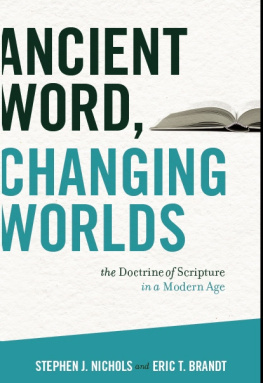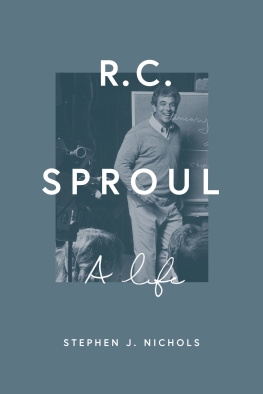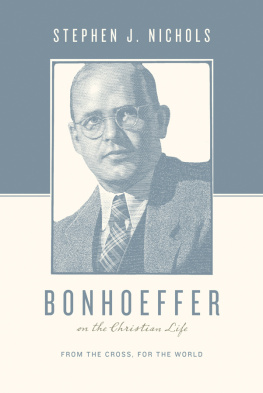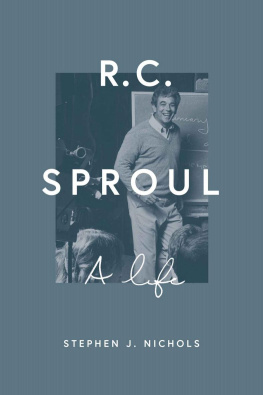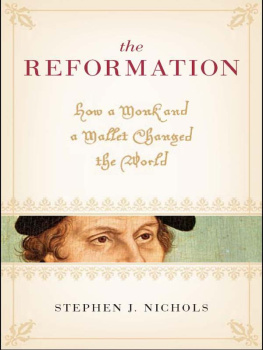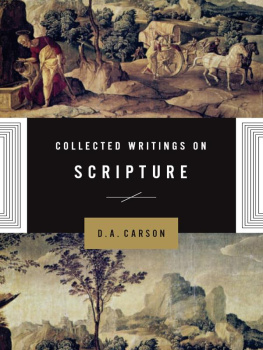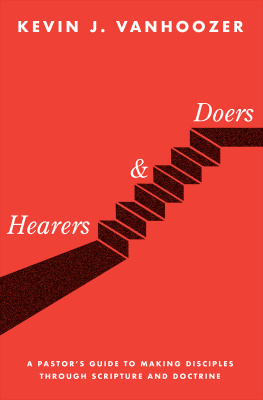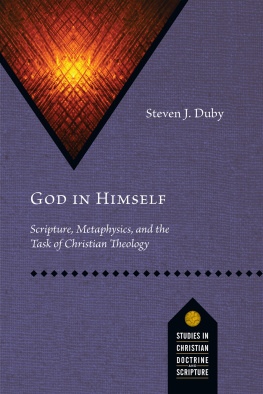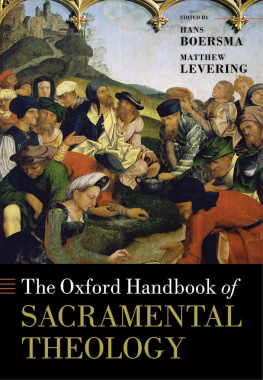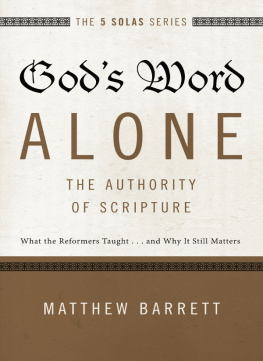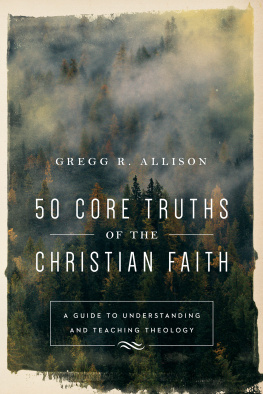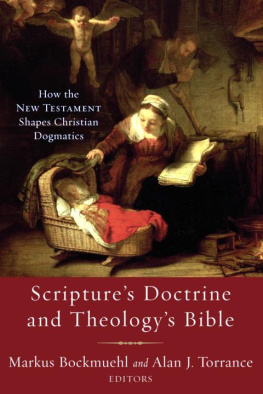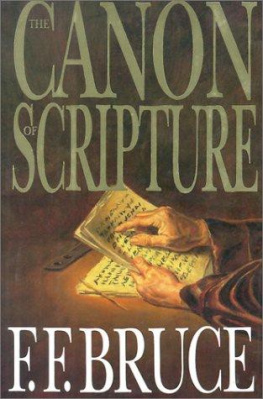The doctrine of Scripture is back on center stage once again, and Nichols and Brandt have provided us with a comprehensive survey of approaches to the doctrine of Scripture, showing the drift among evangelical and Reformed theologians over the past century from a commitment to Scriptures infallibility/inerrancy. This book deserves careful reading even by those who are familiar with the plot-lines of the issue. It would be difficult to exaggerate the timeliness of this book.
DEREK W. H. THOMAS, John E. Richards Professor of Theology, Reformed Theological Seminary; Minister of Teaching, First Presbyterian Church, Jackson, Mississippi
Ancient Word, Changing Worlds is the best, clearest, and most reliable historical overview of the doctrine of Scripture for a contemporary audience. As careful historians, Nichols and Brandt show what the church has always believed about the Bible as the Word of God, and also how our understanding of the inspiration, inerrancy, and interpretation of Scripture has grown through the centuries. The authors let scholars and theologians on all sides of the age-old battle for the Bible speak in their own words, giving us the historical context and theological framework we need to accept the Bibles own witness to its beauty, perfection, and divine authority.
PHILIP RYKEN, Senior Minister, Tenth Presbyterian Church, Philadelphia
ANCIENT WORD, CHANGING WORLDS
Other books by Stephen J. Nichols:
Jonathan Edwards:
A Guided Tour of His Life and Thought. (2001)
Martin Luther:
A Guided Tour of His Life and Thought. (2002)
An Absolute Sort of Certainty:
The Holy Spirit and the Apologetics of Jonathan Edwards. (2003)
The Legacy of Jonathan Edwards:
American Religion and the Evangelical Tradition (co-editor). (2003)
J. Gresham Machen:
A Guided Tour of His Life and Thought. (2004)
Heaven on Earth:
Capturing Jonathan Edwardss Vision of Living in Between.
Crossway Books, (2006)
Pages from Church History:
A Guided Tour of Christian Classics. (2006)
The Reformation:
How a Monk and a Mallet Changed the World. Crossway Books, (2007)
For Us and for Our Salvation:
The Doctrine of Christ in the Early Church. Crossway Books, (2007)
Jesus Made in America:
A Cultural History from the Puritans to The Passion of the Christ. (2008)
Getting the Blues:
What Blues Music Teaches Us about Suffering and Salvation. (2008)

Ancient Word, Changing Worlds
Copyright 2009 by Stephen J. Nichols and Eric T. Brandt
Published by Crossway Books
a publishing ministry of Good News Publishers
1300 Crescent Street
Wheaton, Illinois 60187
All rights reserved. No part of this publication may be reproduced, stored in a retrieval system or transmitted in any form by any means, electronic, mechanical, photocopy, recording or otherwise, without the prior permission of the publisher, except as provided by USA copyright law.
Cover design: Jon McGrath
Cover photo: iStock
First printing, 2009
Printed in the United States of America
Scripture quotations are taken from the ESV Bible (The Holy Bible:
English Standard Version). Copyright 2001 by Crossway Bibles,
a publishing ministry of Good News Publishers. Used by permission.
All rights reserved.
PDF ISBN: 978-1-4335-0547-8
Mobipocket ISBN: 978-1-4335-0548-5
Library of Congress Cataloging-in-publication-data
Nichols, Stephen J., 1970
Ancient Word, changing worlds : the doctrine of Scripture in a
modern age / Stephen J. Nichols and Eric T. Brandt.
p. cm.
Includes bibliographical references.
ISBN 978-1-4335-0260-6 (tpb).
1. BibleEvidences, authority, etc. I. Brandt, Eric T., 1984 . II. Title..
BS480.N48 2009.
220.1dc22
2008040948
VP 19 18 17 16 15 14 13 12 11 10 09
15 14 13 12 11 10 9 8 7 6 5 4 3 2 1
For Heidi
(SJN)
For Megan
(ETB)
Loving wives, cherished friends
Contents
Appendixes
Eric would like to thank Steve for suggesting that they write this book together. He is also grateful to his new bride, Megan, for her support and assistance with this project. He will not easily forget how gracious and encouraging she was as he wrote his last few pages on their honeymoon.
Steve would like to thank his colleagues and administrators at Lancaster Bible College for their commitment to the Word that endures forever. He is also grateful to his wife, Heidi, for reading through his chapters. They are much better off for it.
We are grateful to Lester Hicks, who read an early version of the manuscript and made many helpful observations. Ted Griffin at Crossway once again proved to be a most observant and kind editor. And finally, we are grateful to Al Fisher for both a new and a seasoned friendship.
We dedicate this book to our wives, without whom this book wouldnt have been written.
Mark Twain, as only he could, once said, It is full of interest. It has noble poetry in it; and some clever fables; and some blood-drenched history; and some good morals; and a wealth of obscenity; and upwards of a thousand lies. Of course, you have figured out that he was speaking of the Bible, otherwise referred to as the Good Book. That book has had its defenders and detractors, champions and critics, friends and foes. Perhaps in no time has the Bible been more a subject of controversy, however, than in the modern age, this age of Mark Twain and of the rise of modern science and of rapid and cataclysmic change.
It seems that each age of the church has its unique challenges and opportunities. The early church faced the crisis of persecution and the crises of the heretics who challenged the biblical teaching on, among other things, Christ. The medieval church wrestled with the union of church and empire. The church in the era of the Reformation not only had to withstand the religious and political establishment but also had to reconstruct the church itself, from the platform planks of significant doctrines all the way to the structure of the church service. The church in the modern age, a rather ambiguous descriptor, also faces unique challenges and opportunities. Perhaps chief among them is the role of the supernatural in light of the ascendancy of naturalistic and scientific worldviews. To put the matter differently, what does an ancient book, the supernatural revelation from God contained in the pages of Scripture, have to say to an increasingly complex and changing modern world? How does an ancient word speak to our changing world?
In the past eras of the church, various theologians and church leaders rose to the occasion of the challenges facing the church, leading the church into deeper reflection on Scripture and clearer expression of theology and worship. The Christological heresies of the early church yielded the treasures of the Nicene and Chalcedonian Creeds. The Reformations recovery of both Scripture and the apostolic teaching produced the Reformation solas of sola scriptura (Scripture alone), sola fide and sola gratia (salvation and justification by faith alone and by grace alone), solus Christus (Christ alone), and soli Deo gloria (for the glory of God alone). And so it is in the modern age. The challenge to supernatural revelation, the challenge to the Bible, has been met with deeper reflection on and clearer expression of the doctrines of Scripture. These doctrines orbit around three words, words that have received a great deal of attention in the nineteenth, twentieth, and now into the twenty-first centuries. These three words are
Next page
